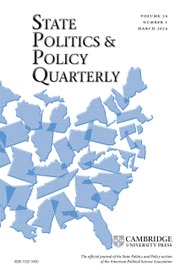Article contents
On California's 1920 Alien Land Law: The Psychology and Economics of Racial Discrimination
Published online by Cambridge University Press: 25 January 2021
Abstract
Scholars have recently highlighted a critical, but previously neglected, facet of racially discriminatory public policies—such policies may be motivated by either economic or psychological forces. That is, racially discriminatory policy may be the result of self-interest and competition in the face of scarcity or prejudices and affects based on group identities. We test if these motivations were behind the passage of an important, openly discriminatory public policy: California's Alien Land Law of 1920. We find that neither motivation alone accounts for the initiative vote that passed this law; both played a role. Our analysis also illustrates how racially discriminatory policies in the early 20th century fit into the ordinary politics of the day.
- Type
- Research Article
- Information
- Copyright
- Copyright © Board of Trustees of the University of Illinois
References
- 6
- Cited by


